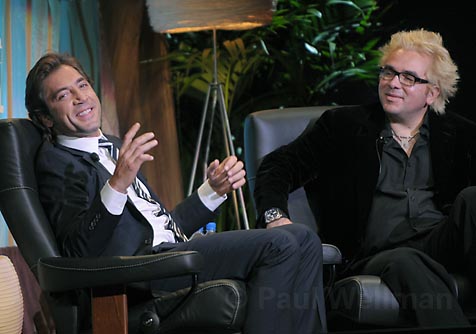Woodard’s Wraps: Film Fest Day Five
Joe Takes In Bardem, Environmentalists, the Eastern Bloc

High in the ranks of the sector of the film festival which could be dubbed “Surprise Hits and Heroes” comes Garbage Warrior, British filmmaker Oliver Hodges‘ entertaining documentary on the righteously – and rationally – crazed New Mexican architect Michael Reynolds. As a champion of “radically sustainable” architecture, (i.e. housing designed to work completely off the utility grid, and built from old beer cans, tires, and the like), Reynolds has been a maverick with a cause for decades, and has suffered for his vision. After building “earth ship” houses and communities around Taos, starting in the ’70s, his architectural license was revoked for years. Reynolds has a powerful story to tell, and a witty/gonzo way of telling it.
But the film is more than just an engaging portrait of a charismatic individualist as he maneuvers through the maze of government bureaucracy. Reynolds’ quest to get a bill passed that encourages experimental architecture leads him to take his case to the field-building “earth ships” in post-catastrophe regions of India and Mexico. As he repeatedly says, what he’s up to is more pressing than ever before, as environmental issues in the wake of global warming move into a state of global emergency. The time to act is yesterday, and Reynolds already has been on the case for much of his life. Like Al Gore’s An Inconvenient Truth, if on a humbler and more personality-specific level, this film demands to be seen by as many humans as possible. Time is of the essence.
Certainly, one of the most strangely captivating moments in the 2007 film year was Javier Bardem’s dazzling role in No Country for Old Men, for which he’s been Oscar nominated in the category of Best Performance by an Actor in a Phantom Role: I mean Supporting Role. As far as bad dudes go, this one was an unsettling blend of Zen warrior and sadistic evil doer, yet we never quite get a handle on him (and some suggest that he may be a ghostly cipher). Bardem, a classically handsome and also eloquent sort, stopped by the Arlington last night to talk about his career so far. That life included some racier “Latin lover” roles early in his life, work with the great, inventive Spaniard Pedro Almodovar, a soul searching phase as a waiter, and a reemergence in distinctive roles throughout this century – Before Night Falls, The Sea Inside, No Country, and recently-completed work with Woody Allen.
Asked by moderator Roger Durling about his choosiness, Bardem made the point that “a character is fifty percent of the performance, so if you choose well, you have fifty percent of your work done. Of course, you have to bring your own thing to the work, but the character will help a lot, just by being well-described on page. I have to really believe what I’m doing and once I believe, I can go far with it.”
From his discerning filmography of the last few years, Bardem, now 38, has clearly taken a more serious approach to his art. “Movies are very entertaining, of course,” he said. “Movies won’t solve the world’s [problems] or give us a clue about the meaning of life, but movies can ask some questions for us to answer. Those are the films I want to be part of.”
Also seens: Macedonian director Milcho Manchevski’s Shadows, an unusually smart entry in the supernatural cinema genre, is part of this year’s especially strong Eastern Bloc programming. Macedonia’s Oscar submission, the film evocatively works its theme of forces beyond the pale, with reflections and shadows taking a primary role in the narrative, along with an erotic subcurrent that feels more Eastern bloc-ish than leeringly Southern California.
Amal, made in Delhi by Canadian director Richie Mehta, is one of those feel-good, formulaic foreign films propped up by blatant tactics and characters. It teeters on melodrama, with good and bad people too-clearly delineated, but still is consistently charming, offering a rare view of Indian life with a few surprises in store.
The Mourning Forest, from Japanese director Naomi Kawase, may be the festival’s most meditative film, and certainly make’s my “Best of the Fest” list. It may take a minute to re-adjust your westernized, hyperactive senses, and pre-programmed hunger for old-fashioned formulaic structure. The theme is mourning, at a forest-based Buddhist center for those who have lost loved ones, but the mood is never morose and humor is ever-waiting in the wings of the film. From the long opening shots through to the truly hypnotic final long take (which gets my vote as the take of the festival), we understand that this film takes its time and delivers its pay-offs from unexpected angles.



